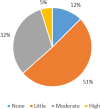Radiation therapist perceptions on how artificial intelligence may affect their role and practice
- PMID: 36479610
- PMCID: PMC10122926
- DOI: 10.1002/jmrs.638
Radiation therapist perceptions on how artificial intelligence may affect their role and practice
Abstract
Introduction: The use of artificial intelligence (AI) has increased in medical radiation science, with advanced computing and modelling. Considering radiation therapists (RTs) perceptions of how this may affect their role is imperative, as this will contribute to increasing the efficiency of implementation and improve service delivery.
Methods: A peer-reviewed anonymous survey was developed and completed by 105 RTs between April and June 2021. The online survey was distributed via the Medical Radiation Practice Board of Australia and the Australian Society of Medical Imaging and Radiation Therapy newsletter as well as professional networks. The survey gained perceptions of the impact of AI on radiation therapy practice and RTs roles within Australia, and data were analysed using quantitative data analysis and thematic analysis.
Results: Automation is used throughout radiation therapy practice, with 68% of RTs being optimistic about this. The majority (63%) had little to no knowledge of working with AI and 96% would like to learn more including the underpinnings of AI and its safe and ethical use. Many (66%) perceived AI would affect their role, including increasing their skillset and reducing mundane tasks, whereas others (23%) perceived it would reduce job satisfaction by increasing repetition and limiting their problem-solving ability. AI was perceived to impact the patient positively (67%), increasing efficiency and accuracy of radiotherapy treatments; however, it could depersonalise patient care.
Conclusion: RTs perceive embracing AI in radiotherapy has the potential to advance the profession and improve the service to patients. If AI is implemented with sufficient training for greater understanding, and management uses these benefits to improve patient care, rather than replace RTs roles, then overall any negatives will be outweighed by the benefits.
Keywords: Artificial intelligence; perceptions; radiation therapists; roles.
© 2022 The Authors. Journal of Medical Radiation Sciences published by John Wiley & Sons Australia, Ltd on behalf of Australian Society of Medical Imaging and Radiation Therapy and New Zealand Institute of Medical Radiation Technology.
Conflict of interest statement
The authors declare no conflict of interest.
Figures
Similar articles
-
Automation and artificial intelligence in radiation therapy treatment planning.J Med Radiat Sci. 2024 Jun;71(2):290-298. doi: 10.1002/jmrs.729. Epub 2023 Oct 4. J Med Radiat Sci. 2024. PMID: 37794690 Free PMC article.
-
Investigating opinions of, and perceptions to, advanced practice radiation therapist roles.J Med Imaging Radiat Sci. 2021 Jun;52(2):198-206. doi: 10.1016/j.jmir.2021.01.008. Epub 2021 Mar 5. J Med Imaging Radiat Sci. 2021. PMID: 33685844
-
Perceptions of Canadian radiation oncologists, radiation physicists, radiation therapists and radiation trainees about the impact of artificial intelligence in radiation oncology - national survey.J Med Imaging Radiat Sci. 2021 Mar;52(1):44-48. doi: 10.1016/j.jmir.2020.11.013. Epub 2020 Dec 13. J Med Imaging Radiat Sci. 2021. PMID: 33323332
-
Africa's readiness for artificial intelligence in clinical radiotherapy delivery: Medical physicists to lead the way.Phys Med. 2023 Sep;113:102653. doi: 10.1016/j.ejmp.2023.102653. Epub 2023 Aug 14. Phys Med. 2023. PMID: 37586146 Review.
-
Artificial intelligence in radiation oncology.Nat Rev Clin Oncol. 2020 Dec;17(12):771-781. doi: 10.1038/s41571-020-0417-8. Epub 2020 Aug 25. Nat Rev Clin Oncol. 2020. PMID: 32843739 Review.
Cited by
-
Are medical oncologists ready for the artificial intelligence revolution? Evaluation of the opinions, knowledge, and experiences of medical oncologists about artificial intelligence technologies.Med Oncol. 2023 Oct 9;40(11):327. doi: 10.1007/s12032-023-02200-9. Med Oncol. 2023. PMID: 37812310
-
Automation and artificial intelligence in radiation therapy treatment planning.J Med Radiat Sci. 2024 Jun;71(2):290-298. doi: 10.1002/jmrs.729. Epub 2023 Oct 4. J Med Radiat Sci. 2024. PMID: 37794690 Free PMC article.
-
Radiation therapists' perspectives on artificial intelligence: Insights from a single institution on Improving effectiveness and educational supports.Tech Innov Patient Support Radiat Oncol. 2025 Jan 5;33:100300. doi: 10.1016/j.tipsro.2025.100300. eCollection 2025 Mar. Tech Innov Patient Support Radiat Oncol. 2025. PMID: 39896145 Free PMC article.
-
Artificial Intelligence and the future of radiotherapy planning: The Australian radiation therapists prepare to be ready.J Med Radiat Sci. 2024 Jun;71(2):174-176. doi: 10.1002/jmrs.791. Epub 2024 Apr 20. J Med Radiat Sci. 2024. PMID: 38641984 Free PMC article.
-
The Radiation Therapist profession through the lens of new technology: A practice development paper based on the ESTRO Radiation Therapist Workshops.Tech Innov Patient Support Radiat Oncol. 2024 Mar 15;30:100243. doi: 10.1016/j.tipsro.2024.100243. eCollection 2024 Jun. Tech Innov Patient Support Radiat Oncol. 2024. PMID: 38831996 Free PMC article.
References
-
- Australian Institute of Health and Welfare [AIHW] . Cancer data in Australia. Updated June 8, 2021. Available from: https://www.aihw.gov.au/reports/cancer/cancer‐data‐in‐australia (Accessed June 20, 2021).
-
- Australian Institute of Health and Welfare . Radiotherapy in Australia 2018–19; 2020. Updated October 7, 2020. Available from: https://www.aihw.gov.au/reports/radiotherapy/radiotherapy‐in‐australia‐2.... (Accessed June 20, 2021).
-
- Pillai M, Adapa K, Das SK, et al. Using artificial intelligence to improve the quality and safety of radiation therapy. J Am Coll Radiol 2019; 16(9, Part B): 1267–72. - PubMed
-
- Houssami N, Lee CI, Buist DSM, Tao D. Artificial intelligence for breast cancer screening: Opportunity or hype? Breast 2017; 36: 31–3. - PubMed
MeSH terms
LinkOut - more resources
Full Text Sources
Miscellaneous





